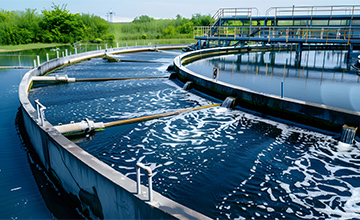Wastewater Treatment
Wastewater treatment is the process of removing contaminants from used water so it can be safely returned to the environment or reused. It plays a major role in protecting public health and conserving natural resources. Effective waste water treatment helps reduce pollution, supports water conservation, and promotes sustainable industrial and commercial practices.
What Are Water Treatment Systems?
Water treatment systems refer to the set of technologies and processes used to clean water for safe use. These systems can include sedimentation, filtration, disinfection, and chemical dosing. Whether used in small-scale use or large industries, the right treatment system ensures water is safe for use and meets environmental compliance.

What Happens at a Wastewater Treatment Plant?
A wastewater treatment plant is a specialized facility designed to treat domestic, industrial, or commercial wastewater. These plants use a combination of mechanical, biological, and chemical processes to remove solids, pathogens, and harmful chemicals from water. Each treatment stage ensures that the final effluent meets regulatory standards for safe discharge or reuse.
What Do Water Filter Systems Do?
The water filter system is designed to remove impurities such as sediment, chlorine, heavy metals and bacteria. These systems are used in both housing and commercial applications. By ensuring cleaner and safer water, filter systems reduce health risks and enhance the efficiency of appliances that rely on water.
What Is Commercial Water Cleaning?
Commercial water cleaning involves the removal of contaminants from water used in businesses such as hotels, factories, and office buildings. These solutions ensure water quality for equipment, production, or customer use. Advanced cleaning systems improve efficiency, reduce downtime, and support sustainability goals.
Benefits of Modern Wastewater Treatment
Modern wastewater treatment reduces pollutants before they enter rivers, lakes, or the sea. It helps conserve water by enabling reuse in agriculture, industrial operations, and landscaping. Effective systems also reduce disease-causing organisms and improve hygiene, contributing to better health outcomes in communities and workplaces.
Challenges Faced in Water Treatment
Water treatment faces challenges such as ageing infrastructure, changing environmental regulations, and increasing demand from population growth and industrialisation. In addition, varying water compositions require flexible and efficient systems. Addressing these issues requires innovation, investment, and reliable expertise.
What Technologies Improve Wastewater Treatment?
New technologies like ceramic membrane filtration, UV disinfection, and biological treatment systems are transforming how wastewater is treated. These technologies help achieve better purification, reduced chemical use, and improved energy efficiency. Automated monitoring systems also allow for real-time adjustments, making treatment plants smarter and more responsive.
Why Is Commercial Water Cleaning Essential?
Commercial spaces use a significant amount of water daily. If not cleaned properly, this water can damage equipment, affect product quality, or pose health risks. Commercial water cleaning ensures that water used in HVAC systems, kitchens, or production lines is safe, clean, and efficient to use.
Comparison of Common Water Treatment Systems
To help you better understand the different options available, here’s a quick comparison of commonly used water treatment systems. This table highlights their core functions, benefits, and where they’re typically applied:
| Water Treatment System | Purpose | Benefits | Typical Applications |
|---|---|---|---|
| Ceramic Membrane Filtration | Advanced physical filtration using ceramic membranes to separate impurities | Delivers ultra-pure water; highly durable; ideal for harsh effluents | Industrial wastewater treatment, food & beverage, pharma, chemical plants |
| Activated Sludge Process | Biological treatment using microbes to break down organic waste | Effective organic pollutant removal; economical to operate | Municipal and industrial wastewater facilities |
| Sedimentation Tanks | Settles out solids from wastewater through gravity | Simple operation; reduces downstream treatment load | Pre-treatment in municipal and industrial plants |
| Chemical Coagulation | Binds fine particles using added chemicals for easier removal | Enhances contaminant removal efficiency | Industrial wastewater, commercial water cleaning |
| Ultraviolet (UV) Disinfection | Uses UV rays to inactivate bacteria and viruses | Eco-friendly; no chemical residue | Final treatment in water filter and treatment systems |
What Is the Future of Water Treatment Systems?
The future of water treatment systems lies in smart automation, real-time data analysis, and energy-efficient processes. Systems are becoming more modular, scalable, and AI-powered to meet diverse needs. Innovations are focusing on improving reliability, reducing carbon footprints, and expanding reuse capabilities across industries.
IPNR's Role in Water Treatment Solutions
At IPNR Endura, we deliver advanced solutions in wastewater treatment plant development and commercial water cleaning. Our water treatment and filter systems based on advanced ceramic tubular alumina membranes are engineered to meet strict performance and environmental standards. As one of the trusted industrial water treatment solution providers, we focus on innovation, quality, and sustainability.

